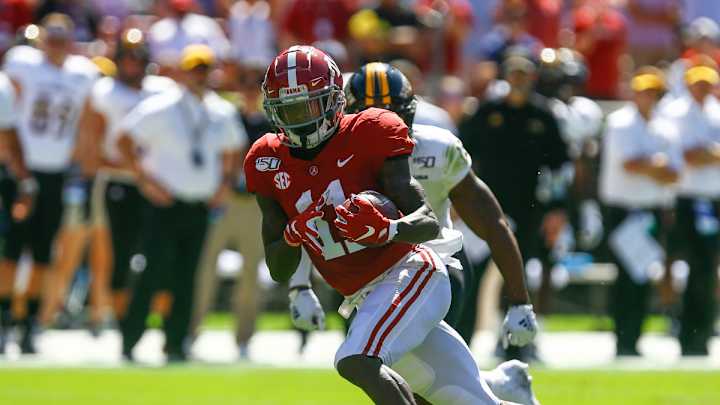Ruggs Gives Raiders One Thing Branch Did

by Tom LaMarre
Throughout their 60-year history, the Raiders have had great wide receivers, from Art Powell to Fred Biletnikoff to Tim Brown.
In the recent NFL Draft, the Silver and Black selected wide receiver Henry Ruggs III of Alabama with the 12th overall pick, and Coach Jon Gruden and General Manager Mike Mayock are hoping he can do what the great Cliff Branch did for them—stretch the field.
“There was that group of the top three wideouts (also including Ruggs’ teammate Jerry Jeudy and CeeDee Lamb of Oklahoma) that everybody wanted to talk about,” Mayock told Rich Eisen of the NFL Network. “We loved all three of them. … At the end of the day, I think the pure speed of Henry Ruggs is kind of what changed things for us.
“We felt like we’ve been bereft of speed both vertically and horizontally, and when you get a guy like Ruggs, not only are you getting a vertical threat—the deep overs, the post routes— you’re also getting those manufactured touches, the horizontal ones—the jet sweeps, the bubble screens.
“ … In one body, we got a potential kick returner, a gunner/jammer, a guy to stretch the field vertically, and I think even more important than all of that ... that element of speed will make Josh Jacobs better, Darren Waller better, everything underneath better, and ultimately our whole offense better.”
That’s what Branch, who ran the 100-meter dash in 10 seconds flat and turned down a chance to run in the 1972 Olympics to get to training camp on time in his rookie year, did in his 15 seasons for the Raiders.
That was especially true during the 1970s and particularly in Super Bowl XI in a 32-14 rout of the Minnesota Vikings. Branch’s threat to go deep opened the middle for tight end Dave Casper, gave master craftsman Biletnikoff more room to run his perfect patterns and also took defenders off the line to aid the runs of Mark van Eeghen and Clarence Davis.
Branch caught three passes for only 20 yards in the game, but his teammates always gave him his share of credit for what he did for the offense.
“When we break the huddle, the first thing the defense looks for is where Cliff is,” quarterback Kenny “Snake” Stabler said. “They are so afraid of him going deep, and they assign two and even three defenders to watch him, try to slow him down. He opens things up for everything we want to do, and he can still get open himself.”
Ruggs, 5-11 and 188 pounds, is similar in size to Branch, who was 5-11 and 170.
And Ruggs ran the 40-yard dash in 4.27 seconds at the NFL Combine, the fourth-fasters time since electronic timing began at the event in 1999.
The Raiders figured that he can stretch the field and open things up for tight end Waller, wide receivers Tyrell Williams, Hunter Renfrow and several promising youngsters, in addition to the runs of his former Alabama teammate Jacobs.
Like Jacobs, Ruggs was not overworked because the Crimson Tide is loaded with talent, but the turned 24 of the 98 passes (for 1,791 yards) he caught in three seasons into touchdowns, and also scored on a 75-yard reverse.
“ (He) was always the most explosive, fastest guy on the field,” Raiders quarterback Derek Carr said after watching all the film he could of Ruggs. “Most people hear 4.2 speed and they’re like, ‘Oh he is a track guy,’ (but) he’s super tough. You could tell that he loves contact.”
Branch was unpolished coming out of Colorado, but benefited coming to the Raiders to learn from Biletnikoff, and Ruggs might never come close to his overall ability.
However, the rookie has one thing Branch also possessed that helped those Raiders win three Super Bowls.
